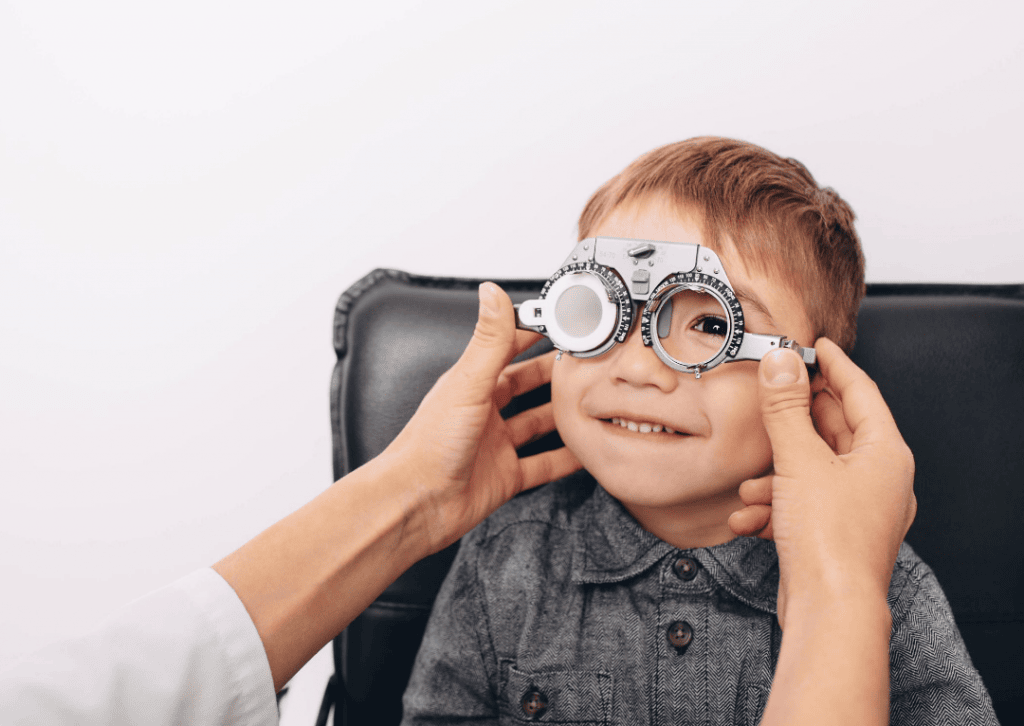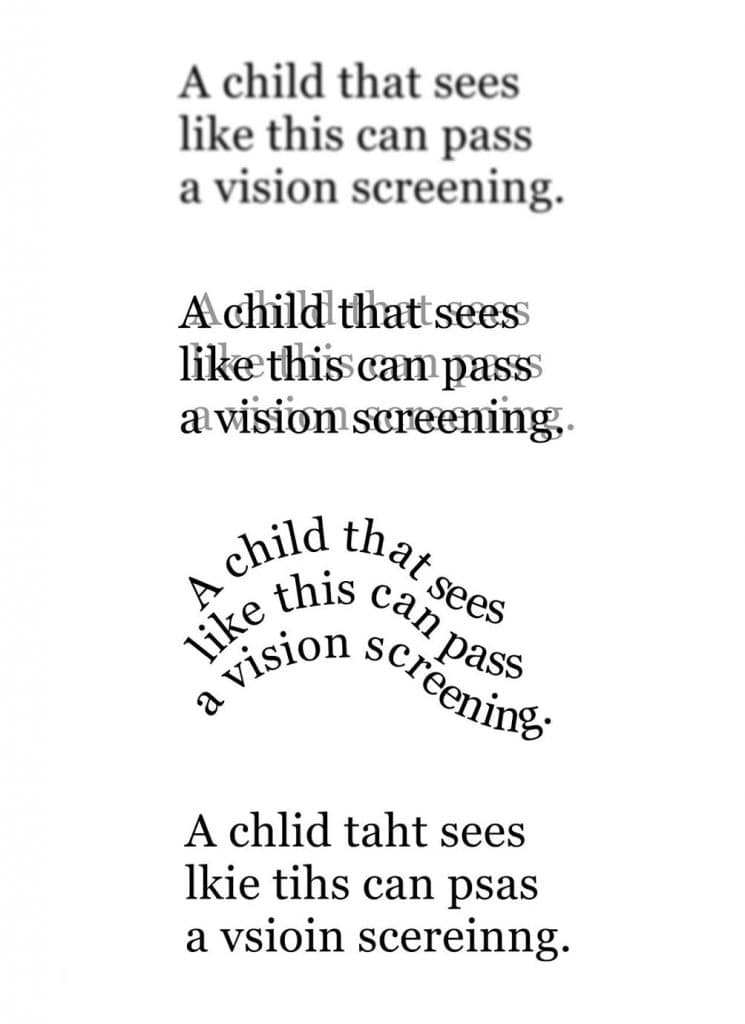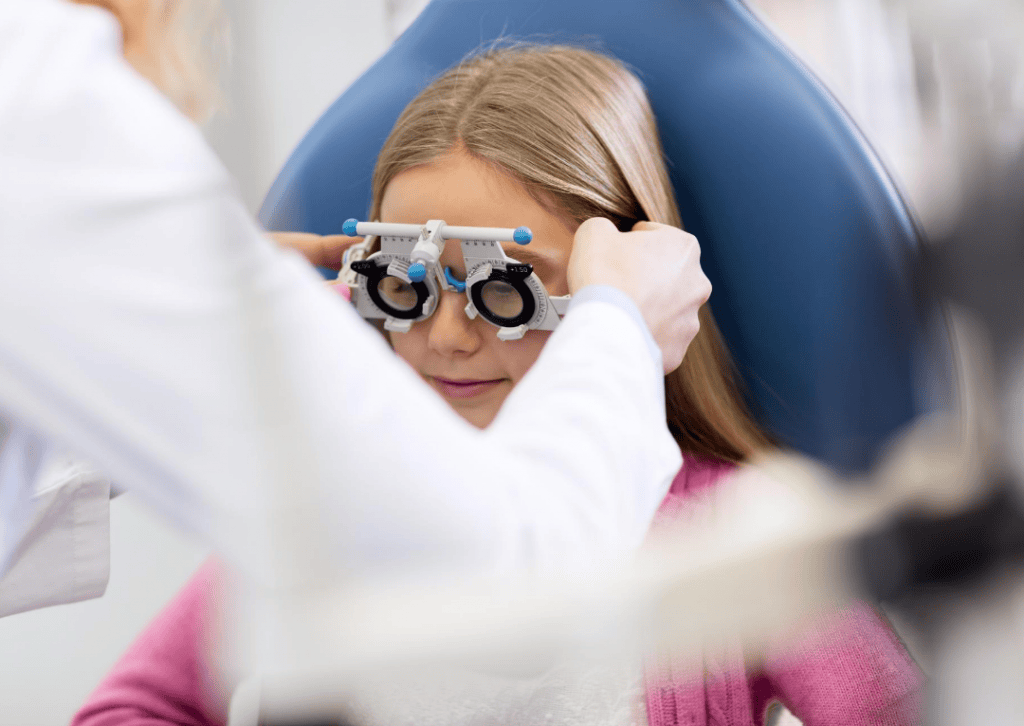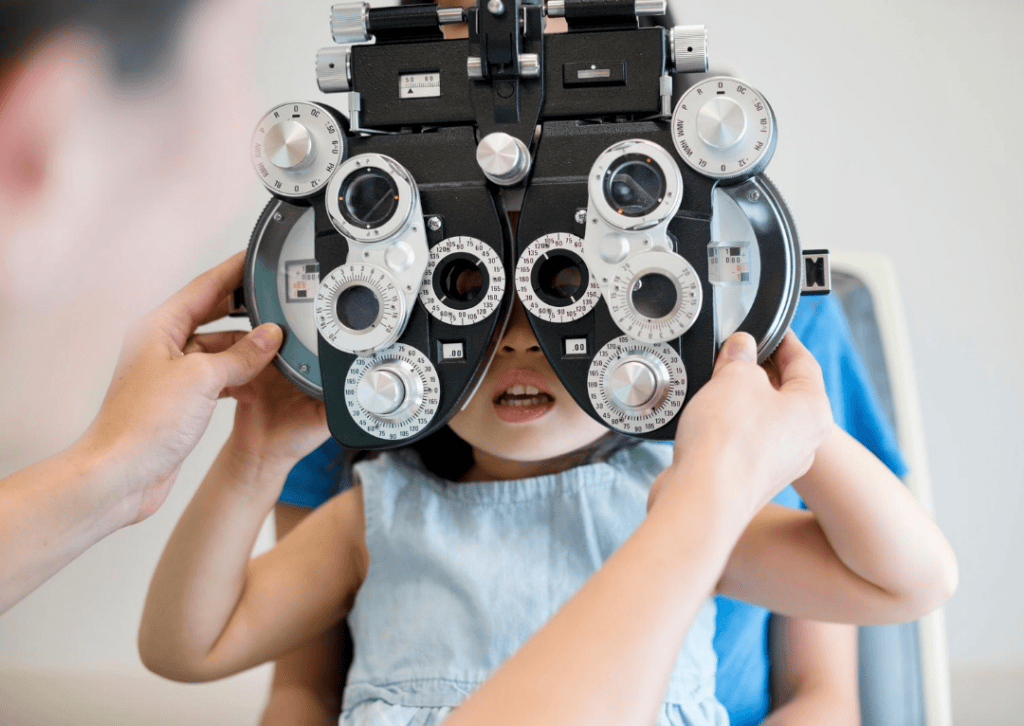
Incredibly, one in five Australian children suffer from an undetected vision problem. However, it can be difficult for parents to tell if their child is having problems with their vision, especially if they are young. Making it even more challenging is that children who experience vision problems often assume that how they see is normal!

While school screenings can be helpful in picking up issues with distance eyesight, they often do not detect other vision problems that can affect your child’s ability to learn both in and out of the classroom.
Regular comprehensive eye examinations help ensure your child’s vision is developing as normal and any underlying vision or eye health conditions can be picked up early.
COMMON VISION PROBLEMS FOR CHILDREN
REFRACTIVE ERROR
Refractive errors are the result of the shape of the eye causing the light to inaccurately focus in the eye, causing blurred vision. The three most common causes of blurred vision for children are Myopia or short-sightedness (blurred distance vision), Hyperopia or long-sightedness (blurred near vision), and astigmatism (can cause blurred vision at distance and near). Myopia is the most common refractive error in children and is on the rise due to our changing lifestyle – less outside play and more time indoors on digital devices.
EYE MOVEMENT PROBLEMS
Eye movements help us keep place and scan effectively when reading. If eye movements are slow or clumsy, or the eyes jump or “stutter”, it can make it more difficult to accurately read and process visual information. Eye movements are also important for sport as they help us find objects in space and judge their position.
EYE TEAMING PROBLEMS
Our eyes should work as a team in order to perform as one, however, some children do not adequately develop this skill in their early years. Children with poor eye teaming skills are only able to aim their eyes together correctly for short periods of time. Over time, words may become blurred or there may be double vision.
FOCUSING PROBLEMS
Eye focusing (also known as accommodation) skills allows us to see clearly at different distances. It also gives us the ability to quickly shift focus when looking from near to far, for example, when a child is looking from their desk to the board at school. Our eyes should automatically focus and be able to maintain this focus while doing close vision tasks. When children have focusing issues, their eyes fatigue very quickly and they are unable to sustain the effort required to keep focus and control over their eyes. This usually results in blurred vision when doing prolonged close work, headaches, and eye strain.
VISUAL PERCEPTION PROBLEMS
Visual perception skills refer to the skills developed from experience – relating size, shape, texture, location and distances. Visual perception is the ability of the brain to interpret and understand what is being seen by the eyes. A child is likely to have visual perception problems if they reverse letters and numbers, have difficulty recognising familiar words, having problems recognising their own errors and have poor planning and spacing on paper.

KEEP AN EYE OUT FOR…
If your child routinely exhibits any of these signs, a comprehensive behavioural vision examination is recommended.
APPEARANCE OF EYES
- One eye turns in or out
- Red, burning, itchy or watery eyes
- Frequent blinking or rubbing of the eyes
- Squinting
WHEN WRITING
- Writes uphill or downhill, poorly spaced writing, or unable to stay on ruled lines
- Repeats letters within words, reverses letters or omits letters, numbers or phrases
- Squints, closes, or covers one eye
- Slow, untidy, or frequent mistakes when writing or copying
WHEN READING
- Holds book very close when reading
- Loses place often or uses a finger to keep place
- Leaving out words frequently, confuses similar words or fails to recognise the same word in a text
- Re-reads or skips lines
- Complains of blurred vision or double vision
- Complains words move or “swim” on the page
- Whispers to self while reading
- Short attention span or quickly loses interest while reading
OTHER PROBLEMS
- Squinting or sitting very close when watching television
- Tilting head to one side
- Must feel things to understand
- Often confuses left and right
- Avoids reading and other close work
- Fatigues easily
- Frequent headaches
WHAT HAPPENS IN AN EYE EXAMINATION?

During a behavioural vision examination, the optometrist will measure your child’s sharpness of sight and the prescription if required, to provide clear and comfortable vision (acuity and refraction).
They will also assess the ability of the eyes to work together as a team (eye teaming), the accuracy and ease of eye movements and the effort required to maintain focus and control over the eyes (eye movement and accommodation), and your child’s ability to distinguish between colours.
A full assessment of the health of their eyes will also be conducted, including checking for any abnormalities, signs of eye diseases and other health conditions.
WHEN SHOULD MY CHILD HAVE AN EYE EXAMINATION?
At age 3, an examination is recommended to ensure there are no signs of a lazy or turned eye or high degrees of long or shortsightedness. Before your child commences primary school, a comprehensive behavioural assessment is recommended to check for any vision problems that may interfere in learning.

Nicole is a paediatric optometrist at Bullcreek Optometrist in Leeming. She loves being able to help people resolve their vision and learning concerns; taking the time to listen to her patient’s concerns and working towards the best solution for each individual. Children’s vision, vision therapy, and myopia management are the areas Nicole is particularly passionate about.
Nicole studied Optometry in Glasgow and has since completed an Advanced Certificate in Children’s Vision and additional studies in Vision Therapy. Nicole spent time consulting in Scotland and England before making the move to Australia in 2006. When she’s not busy looking at eyes, Nicole enjoys spending time in the great outdoors with her kids.



